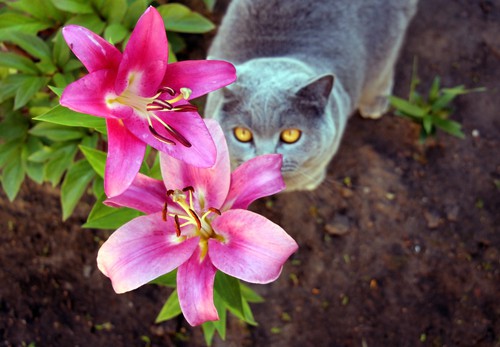Are Lilies Poisonous to Cats and Dogs?
Our site is reader supported, this means we may earn a small commission from Amazon and other affiliates when you buy through links on our site.
A lover of lilies who has pets is always on edge, especially with a garden teeming with lilies. While these flowering plants are ornamental, they can be fatal to your beloved pets when ingested, more so to cats. As a pet owner, avoid this disaster using the tips and tricks presented below. This way, you can keep enjoying the beautiful flowers while keeping your pets safe.
Why are lilies poisonous to cats and dogs?
Dogs are known to handle the toxins in lilies better than cats, but that does not mean they are safe. Ingesting large quantities of lilies can be fatal, while small amounts result in diarrhoea, drooling, and vomiting among other symptoms.
It is not clear which toxins are responsible for these effects, but it is advisable to keep your cats and dogs away from lilies. Cats receive the short end of the stick because ingestion of lilies brings about nephrotoxicity, which if left untreated, results in kidney failure.
For some peculiar reason, cats are drawn to lilies and are more likely to ingest them than dogs too. Even if the cats do not ingest the lilies, pollen stuck in their fur could cause harm when picked up by the tongue while licking. That is why you are encouraged to wash the pet to get rid of the pollen in the fur.
To be on the safe side it’s usually a good idea not to have lilies at all, especially if they seem to take an interest in them.
Are there non-poisonous lilies for pets
Under the lily family umbrella, you will find several species and hybrids. Some types of lilies are considered more dangerous than others due to the symptoms presented. The less harmful ones include the Peruvian, Peace, and Calla lilies that typically induce a short-lived stomach upset.
The more dangerous types in the list include Lily of the valley, Asiatic lily, Rubum lily, Tiger lily, and Daylily among others. Regardless of whether the lily is greatly or faintly catastrophic, your dogs and cats are better off keeping their distance.
My pet ingested lilies; what to do
Handling a sick pet is distressing; however, the faster you act, the better for your pets, letting the pets struggle for a couple of days may be fatal. The intensity of the symptoms will depend on the pet’s size and intake amount.
If your pet has taken a large amount, fast action is best. Some signs you should look for in your pet, whether cat or dog include:
Initial symptoms
- Minimal movement
- Diarrhoea
- Vomiting
- Limited appetite
- Drooling
Critical symptoms
- LethargyIrregular heart rhythm
- Stomach pain
- Tremors
- Depression
- Kidney issues in extreme conditions
Call the vet as soon as you can and take the animal to a vet where it can receive an emergency intervention. The vet may administer charcoal to absorb the toxins from the stomach, but other measures such as IVs can be used.
The treatment of the animal will depend on the intensity of the poison and what the vet deems as best.
Read next: How to get lily pollen out of cloths
How to prevent your pets from eating lilies?
If removing the lilies from your property is not an adoption, you can try using chilli to deter the animals from eating the plants. Using fine chilli with a strong smell is a suitable option because animals don’t generally like chilli. To ensure the chilli stays on the plant, water the plants from the base and for potted lilies, move them away from strong winds.
Construct physical barriers around the plants or use a natural spray consisting of real lemon juice and water. The citrus approach is popular with many because both cats and dogs despise the citrus scent.
Did you know some conifers are poisonous to dogs? especially taxus (yet trees), learn more here
Final Conclusion
The option to remove lilies from your garden is the simplest path to take in preventing your pets from ingesting the plants. If this option does not sit well with you, try your best to set up suitable prevention measures.

